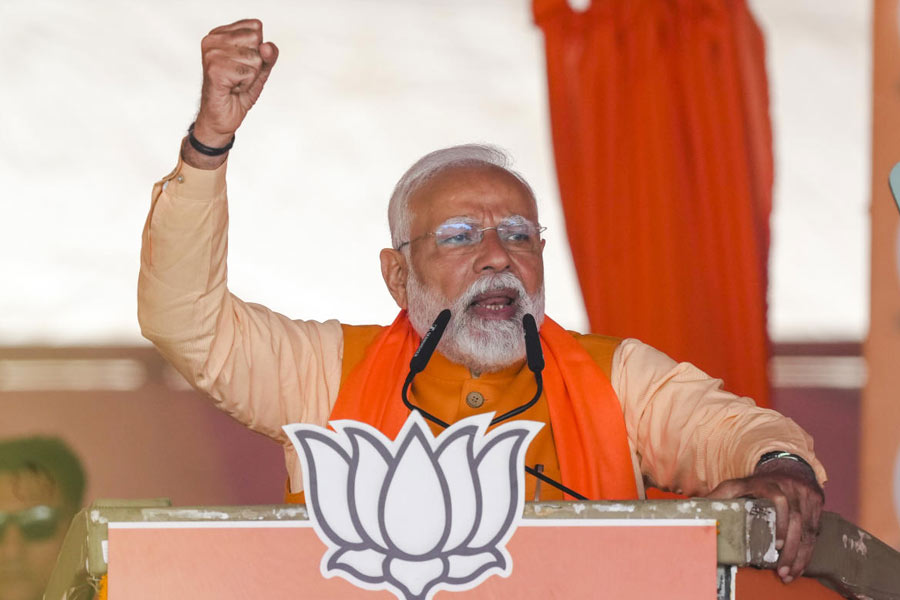 |
Time: Evening rush hour. Place: On a train at Esplanade Metro station. Eight persons are sitting on a seat reserved for women. One of them is male and has a small bandage wrapped around his toe. A well-dressed woman stands in front of the man and looks at him pointedly. He shuffles. His wife, who has a baby on her lap, tells him not to get up.
The other woman, who is still standing, points out that the seat is for “ladies”. The man points at his injury and says that he can’t get up. The woman, adamant, points out that there is a separate seat for the handicapped. Other women standing in front of the seat are quiet. “You needn’t tell me where the seats are. I know already. You are just being selfish,” the man says in a loud, harsh voice.
The woman is taken aback. “Why are you speaking this way? I just pointed out a simple fact,” she tries to say. The man gets up and takes the baby from his wife’s lap. He doesn’t limp or show any discomfort while walking or getting off the train at Park Street .
But he leaves the passengers divided. Men standing near the seat snigger. There are sarcastic comments, such as: “Women want equality as well as reservation.” A young woman points out: “We wouldn’t mind standing. But the sheer rudeness of sitting in the ladies section and shouting at an unknown woman is what I found so galling.”
The lady ultimately got a seat, if only because the man chose to get off at the next station. But the questions remained. Can women use their sex to their own advantage that easily? What does gender have to with making their life easier or tougher? When is it convenient to be a woman and when is it not? When is privilege not an advantage?
It helps to be a woman — and it doesn’t. Metro visits a few places from a woman’s point of view:
Queues
There are a few places where women take advantage unabashedly. In queues gender can play an important role. Standing at the Metro ticket counter, or the railway counter, or the multiplex. Women have a habit of looking frail, or troubled, or ill, and making a gesture with their hands, which can mean “please”, “ektu” or “thodi si meherbani kijiye”, before they jump the queue.
In extreme cases, women have been known to complain of fainting spells or another pressing engagement or even PMS and getting away with it simply by virtue of being a woman.
“I am not entirely proud of it but I must admit to having pretended to be sick and faint just to escape standing in the sun and waiting to collect my examination forms and I think the fact that I am petite and quite pale makes it all the more believable,” says Swati Majumdar, a masters student.
Smiling, smiling
Smiling and sweet-talking their way through is another way women often get away with murder. “I have used the combination of a smile and the ‘I’m a poor student from out of town who can’t come all this way again’ line to charm guards at monuments from the Park Street Cemetery to Tagore’s House at Jorasanko and managed to take a last look around these places after closing time,” says Divya Kumar, a 28-year-old media professional.
Monali Ghosh, 23, who works in a market research firm, admits that it helps to be a woman. “Say I’m doing a feasibility study for a client who wants to set up base in Chennai. I will have to call up head-hunters and senior managers for their inputs and fill up detailed questionnaires. Most people do not want to waste their time by taking our calls. But it helps if a very polite young woman calls. The likelihood of them hanging up on us is less,” she smiles.
But this very fact also goes against her. “I want to utilise my skills better. But the company would rather have me here.”
She and her woman colleagues also have to put up with the odd comment about “how women have it easier”.
Chivalrous cabbie
Playing the damsel in distress tends to help with the occasional chivalrous taxi driver. “Me and my two girl friends had gone out for a night of partying and were taking a cab back home to south Calcutta . On the way we decided to stop for tea at Sharma Dhaba and our protective and rather friendly cab driver kept all the less-than-sober men at a safe distance, preventing them from leering at us, which was a very nice gesture,” says Kumar.
But not all taxi drivers are that helpful. Some would rather not take on a female passenger at the dead of the night. Many taxi drivers wouldn’t take women on because they are potential distress. Management trainee Shalini Ray, 22, says she finds it harder to get taxis than her male counterparts. “I still don’t know what to do when the taxi driver refuses to go. Men just get into the taxi, shout at the driver if he refuses to take them in and intimidate him into going. I don’t think ‘I’ll box your ears’ from me will have the same effect,” she laughs. Threatening to complain to the police often doesn’t work, as the drivers couldn’t care less.
A woman is hardly in a position to even offer the Rs 20 extra. We are not getting into the incidence of taxi drivers molesting women passengers.
Wheel deal
Offending women drivers get off easily, on the surface.
Playing distressed and smiling can help women out with the cops. They can come to the woman driver’s help readily. There is also a profusion of men who will appear when a tyre needs to be changed and that is an advantage only women have. They rarely have to get their hands dirty tugging at the jack!
But women drivers are universally hated, really, and ridiculed because they are women.
They are accused of not having any sense of direction, confidence or driving acumen. It’s in their “nature”, they are told. “Some time back one of my roommates had an accident while driving and the guys screamed at her saying women can’t drive and women can’t handle alcohol (this was after she had consumed one glass of wine). This was a terribly chauvinistic statement to make,” said Priyanka Ghosh, a corporate lawyer.
Pooja Goyel (name changed), a 25-year-old entrepreneur, says she isn’t allowed to touch the family car for a number of reasons. “One of them is that I’m too ‘scatter-brained’ to drive a car,” she says. “Besides Calcutta roads are apparently not safe for women drivers,” she shrugs again.
Male company
Women always get men to escort them. “If it’s really late into the night, it obviously helps if you have male company. I know it’s safer and more practical,” says 24-year-old schoolteacher Madhurima Mukhopadhyay, who faced an unpleasant experience going back home late.
“If a woman is getting a little tipsy, then it’s nice if the man stays back to ensure her safety,” says public relations entrepreneur Paromita Ghosh. Women take advantage too. But how fair is it to drink and lose control just because you know that someone will be there to drop you home? Srijani Das (name changed), a 23-year-old economics student, admits that it happens all the time. “During our get-togethers most of the girls in the gang get pretty drunk. And one or two guys in a group stay sober, in case there is trouble. I never thought it was unfair. They get to watch the fun!”
Again, there is a price to pay. Chivalry can just tip over into chauvinism. Male company in itself can become a constraint. “Some take it upon themselves to make sure a female friend doesn’t drink any further. What about her choices? Why does the man’s concern for the woman’s welfare give him the right to bar the woman from another drink?” asks Paromita.
Wine dine
At the restaurant, the bill automatically goes to the man. If the woman is not working, it’s fine. “If I’m a non-working student, and a friend and I go out for dinner and he is working and foots the bill, I think that’s really sweet,” says Pallavi Pinakin, a 23-year-old student of English literature.
But the wine list also goes to the man. “Every time that I meet my boyfriend for a drink or dinner, I get the food menu and he is given the wine list, even if it is me ordering the drink,” says Kumar. “The bill at the end of the meal is also kept carefully away from me in some kind of a secret nexus between the men. Even though we split the amount, it’s this strange gender code at the plushest restaurant and pub to the neighbourhood dhaba that really bothers me,” she continues. And all women don’t want to be paid for all the time. “My previous boyfriend kept insisting on paying for everything. I was in college then and money was short, but I know when I can afford to pay and when I can’t and I’ll let you know on the days that I can’t,” says Madhurima.
And so it continues. Women, generally less interested in money matters, are spared the decimal calculations, but when they ask male family members or colleagues for advice they are given orders. “I really hate the faintly sceptical look I get when I talk about my investments. I was talking to a colleague about my investments and his reaction was ‘Are you sure?’ ‘Did you ask anyone before investing?’ And the funny part was I am in the finance department and he is in HR. So technically I probably know more,” laughs Shalini.
Women, coming home late from office, ask for a drop home from a male colleague and are forced to take a lift every evening. Men want their women to look hot, which is fine with the women, but fix the length of the neckline. And ask them not to smoke.
It’s difficult to judge where to stand between “empowerment” and “reservation”. It is still convenient to be a woman — and it is not.











